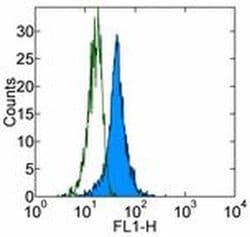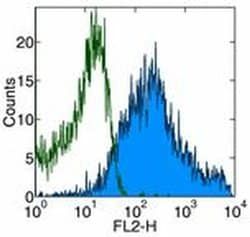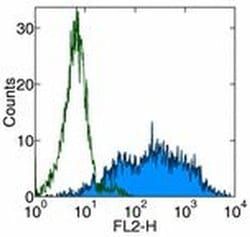50-126-86
CD68 Monoclonal Antibody (eBioY1/82A (Y1/82A)), eBioscience™, Invitrogen™
Manufacturer: Invitrogen
Select a Size
| Pack Size | SKU | Availability | Price |
|---|---|---|---|
| Each of 1 | 50-126-86-Each-of-1 | In Stock | ₹ 12,460.00 |
50-126-86 - Each of 1
In Stock
Quantity
1
Base Price: ₹ 12,460.00
GST (18%): ₹ 2,242.80
Total Price: ₹ 14,702.80
Antigen
CD68
Classification
Monoclonal
Concentration
0.5 mg/mL
Formulation
PBS with 0.09% sodium azide; pH 7.2
Gene Accession No.
P34810
Gene Symbols
Cd68
Purification Method
Affinity chromatography
Regulatory Status
RUO
Gene ID (Entrez)
968
Content And Storage
4° C
Form
Liquid
Applications
Flow Cytometry, Immunocytochemistry, Immunohistochemistry (Frozen)
Clone
eBioY1/82A (Y1/82A)
Conjugate
Unconjugated
Gene
Cd68
Gene Alias
CD68; CD68 antigen; CD68 molecule; GP110; Lamp4; macrophage antigen CD68; macrosialin; Scard1; scavenger receptor class D, member 1; similar to CD68 antigen
Host Species
Mouse
Quantity
100 μg
Primary or Secondary
Primary
Target Species
Human
Product Type
Antibody
Isotype
IgG2b κ
Description
- Description: The eBioY1/82 antibody reacts with CD68 which belongs to the sialomucin family and is closely related to the family of lysosomal-associated membrane proteins (lamps) and scavenger receptor
- CD68 is predomitly an intracellular protein, found mainly in the late endosomal compartment but can be detected in smaller amounts on the surface of cells of mainly myeloid derived cells; monocytes and macrophages, dendritic cells (and in some langerhan cells), neutrophils, basophils mast cells, myeloid progenitor cells, and a subset of CD34+ hemopoietic bone marrow progenitor cells
- The function has not been fully elucidated but based on it's homolgy and structure suggests a role in antigen processing or presentation and protection of the lysosomal membrane from hydrolytic enzymes
- Reports have also seen expression in activated T cells, and about 40% of peripheral blood B-lymphocytes and 50% of all B-ALL
- Staining with eBioY1/82A shows surface staining on B cells and a minor percentage of monocytes while intracellular staining results in about 50% of B cells and most monocytes
- Applications Reported: This eBioY1/82A (Y1/82A) antibody has been reported for use in flow cytometric analysis, and immunohistology staining of frozen tissue sections
- Applications Tested: This eBioY1/82A (Y1/82A) antibody has been tested by intracellular staining and flow cytometric analysis
- This can be used at less than or equal to 1 μg per test
- CD68 (Macrosialin) is a 110 kDa integral membrane glycoprotein predominantly expressed on the intracellular lysomsomes of monocytes and macrophages and to a lesser extent by dendritic cells and peripheral blood granulocytes
- Also, CD68 could play a role in phagocytic activities of tissue macrophages, both in intracellular lysosomal metabolism and extracellular cell-cell and cell-pathogen interactions
- CD68 is expressed by interdigitating reticulum cells in tonsil and some histiocytic lymphoma or histiocytosis, acute myeloid leukemia (AML), and granulocytic sarcoma
- Elevated expression of CD68 has been demonstrated on CD34+ cells in various human malignancies, including several Acute Myeloid Leukemia studies.
Compare Similar Items
Show Difference
Antigen: CD68
Classification: Monoclonal
Concentration: 0.5 mg/mL
Formulation: PBS with 0.09% sodium azide; pH 7.2
Gene Accession No.: P34810
Gene Symbols: Cd68
Purification Method: Affinity chromatography
Regulatory Status: RUO
Gene ID (Entrez): 968
Content And Storage: 4° C
Form: Liquid
Applications: Flow Cytometry, Immunocytochemistry, Immunohistochemistry (Frozen)
Clone: eBioY1/82A (Y1/82A)
Conjugate: Unconjugated
Gene: Cd68
Gene Alias: CD68; CD68 antigen; CD68 molecule; GP110; Lamp4; macrophage antigen CD68; macrosialin; Scard1; scavenger receptor class D, member 1; similar to CD68 antigen
Host Species: Mouse
Quantity: 100 μg
Primary or Secondary: Primary
Target Species: Human
Product Type: Antibody
Isotype: IgG2b κ
Antigen:
CD68
Classification:
Monoclonal
Concentration:
0.5 mg/mL
Formulation:
PBS with 0.09% sodium azide; pH 7.2
Gene Accession No.:
P34810
Gene Symbols:
Cd68
Purification Method:
Affinity chromatography
Regulatory Status:
RUO
Gene ID (Entrez):
968
Content And Storage:
4° C
Form:
Liquid
Applications:
Flow Cytometry, Immunocytochemistry, Immunohistochemistry (Frozen)
Clone:
eBioY1/82A (Y1/82A)
Conjugate:
Unconjugated
Gene:
Cd68
Gene Alias:
CD68; CD68 antigen; CD68 molecule; GP110; Lamp4; macrophage antigen CD68; macrosialin; Scard1; scavenger receptor class D, member 1; similar to CD68 antigen
Host Species:
Mouse
Quantity:
100 μg
Primary or Secondary:
Primary
Target Species:
Human
Product Type:
Antibody
Isotype:
IgG2b κ
Antigen: CD69
Classification: Monoclonal
Concentration: 0.5 mg/mL
Formulation: PBS with 0.09% sodium azide; pH 7.2
Gene Accession No.: P37217
Gene Symbols: CD69
Purification Method: Affinity chromatography
Regulatory Status: RUO
Gene ID (Entrez): 12515
Content And Storage: 4° C
Form: Liquid
Applications: Flow Cytometry, Functional Assay, Immunohistochemistry, Immunoprecipitation
Clone: H1.2F3
Conjugate: Unconjugated
Gene: CD69
Gene Alias: 5830438K24Rik; Activation inducer molecule; activation inducer molecule (AIM/CD69); AI452015; AIM; BL-AC/P26; CD69; CD69 antigen; CD69 antigen (p60, early T-cell activation antigen); CD69 molecule; CLEC2C; C-type lectin domain family 2 member C; C-type lectin domain family 2, member C; EA1; early activation antigen CD69; early lymphocyte activation antigen; early T-cell activation antigen p60; GP32/28; leukocyte surface antigen Leu-23; MLR-3; VEA; Very Early Activation Antigen
Host Species: Armenian Hamster
Quantity: 100 μg
Primary or Secondary: Primary
Target Species: Mouse
Product Type: Antibody
Isotype: IgG
Antigen:
CD69
Classification:
Monoclonal
Concentration:
0.5 mg/mL
Formulation:
PBS with 0.09% sodium azide; pH 7.2
Gene Accession No.:
P37217
Gene Symbols:
CD69
Purification Method:
Affinity chromatography
Regulatory Status:
RUO
Gene ID (Entrez):
12515
Content And Storage:
4° C
Form:
Liquid
Applications:
Flow Cytometry, Functional Assay, Immunohistochemistry, Immunoprecipitation
Clone:
H1.2F3
Conjugate:
Unconjugated
Gene:
CD69
Gene Alias:
5830438K24Rik; Activation inducer molecule; activation inducer molecule (AIM/CD69); AI452015; AIM; BL-AC/P26; CD69; CD69 antigen; CD69 antigen (p60, early T-cell activation antigen); CD69 molecule; CLEC2C; C-type lectin domain family 2 member C; C-type lectin domain family 2, member C; EA1; early activation antigen CD69; early lymphocyte activation antigen; early T-cell activation antigen p60; GP32/28; leukocyte surface antigen Leu-23; MLR-3; VEA; Very Early Activation Antigen
Host Species:
Armenian Hamster
Quantity:
100 μg
Primary or Secondary:
Primary
Target Species:
Mouse
Product Type:
Antibody
Isotype:
IgG
Antigen: CD69
Classification: Monoclonal
Concentration: 0.5 mg/mL
Formulation: PBS with 0.09% sodium azide; pH 7.2
Gene Accession No.: Q07108
Gene Symbols: CD69
Purification Method: Affinity chromatography
Regulatory Status: RUO
Gene ID (Entrez): 969
Content And Storage: 4° C
Form: Liquid
Applications: Flow Cytometry, Immunohistochemistry
Clone: FN50
Conjugate: Unconjugated
Gene: CD69
Gene Alias: 5830438K24Rik; Activation inducer molecule; activation inducer molecule (AIM/CD69); AI452015; AIM; BL-AC/P26; CD69; CD69 antigen; CD69 antigen (p60, early T-cell activation antigen); CD69 molecule; CLEC2C; C-type lectin domain family 2 member C; C-type lectin domain family 2, member C; EA1; early activation antigen CD69; early lymphocyte activation antigen; early T-cell activation antigen p60; GP32/28; leukocyte surface antigen Leu-23; MLR-3; VEA; Very Early Activation Antigen
Host Species: Mouse
Quantity: 100 μg
Primary or Secondary: Primary
Target Species: Human
Product Type: Antibody
Isotype: IgG1 κ
Antigen:
CD69
Classification:
Monoclonal
Concentration:
0.5 mg/mL
Formulation:
PBS with 0.09% sodium azide; pH 7.2
Gene Accession No.:
Q07108
Gene Symbols:
CD69
Purification Method:
Affinity chromatography
Regulatory Status:
RUO
Gene ID (Entrez):
969
Content And Storage:
4° C
Form:
Liquid
Applications:
Flow Cytometry, Immunohistochemistry
Clone:
FN50
Conjugate:
Unconjugated
Gene:
CD69
Gene Alias:
5830438K24Rik; Activation inducer molecule; activation inducer molecule (AIM/CD69); AI452015; AIM; BL-AC/P26; CD69; CD69 antigen; CD69 antigen (p60, early T-cell activation antigen); CD69 molecule; CLEC2C; C-type lectin domain family 2 member C; C-type lectin domain family 2, member C; EA1; early activation antigen CD69; early lymphocyte activation antigen; early T-cell activation antigen p60; GP32/28; leukocyte surface antigen Leu-23; MLR-3; VEA; Very Early Activation Antigen
Host Species:
Mouse
Quantity:
100 μg
Primary or Secondary:
Primary
Target Species:
Human
Product Type:
Antibody
Isotype:
IgG1 κ
Antigen: CD70
Classification: Monoclonal
Concentration: 0.5 mg/mL
Formulation: PBS with 0.09% sodium azide; pH 7.2
Gene Accession No.: O55237
Gene Symbols: Cd70
Purification Method: Affinity chromatography
Regulatory Status: RUO
Gene ID (Entrez): 21948
Content And Storage: 4° C
Form: Liquid
Applications: Flow Cytometry, Functional Assay, Immunoprecipitation, Neutralization
Clone: FR70
Conjugate: Unconjugated
Gene: Cd70
Gene Alias: CD27 ligand; Cd27l; CD27-L; CD27LG; CD70; CD70 antigen; Cd70 molecule; Ki-24 antigen; surface antigen CD70; Tnfsf7; TNLG8A; tumor necrosis factor (ligand) superfamily, member 7; tumor necrosis factor ligand 8A; tumor necrosis factor ligand superfamily member 7
Host Species: Rat
Quantity: 100 μg
Primary or Secondary: Primary
Target Species: Mouse
Product Type: Antibody
Isotype: IgG2b κ
Antigen:
CD70
Classification:
Monoclonal
Concentration:
0.5 mg/mL
Formulation:
PBS with 0.09% sodium azide; pH 7.2
Gene Accession No.:
O55237
Gene Symbols:
Cd70
Purification Method:
Affinity chromatography
Regulatory Status:
RUO
Gene ID (Entrez):
21948
Content And Storage:
4° C
Form:
Liquid
Applications:
Flow Cytometry, Functional Assay, Immunoprecipitation, Neutralization
Clone:
FR70
Conjugate:
Unconjugated
Gene:
Cd70
Gene Alias:
CD27 ligand; Cd27l; CD27-L; CD27LG; CD70; CD70 antigen; Cd70 molecule; Ki-24 antigen; surface antigen CD70; Tnfsf7; TNLG8A; tumor necrosis factor (ligand) superfamily, member 7; tumor necrosis factor ligand 8A; tumor necrosis factor ligand superfamily member 7
Host Species:
Rat
Quantity:
100 μg
Primary or Secondary:
Primary
Target Species:
Mouse
Product Type:
Antibody
Isotype:
IgG2b κ



